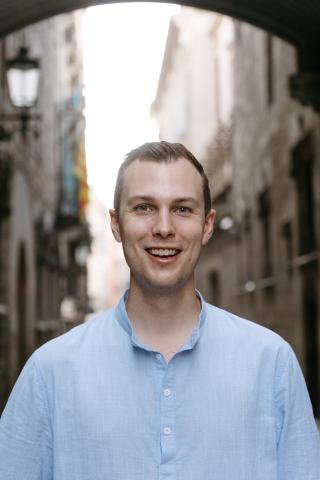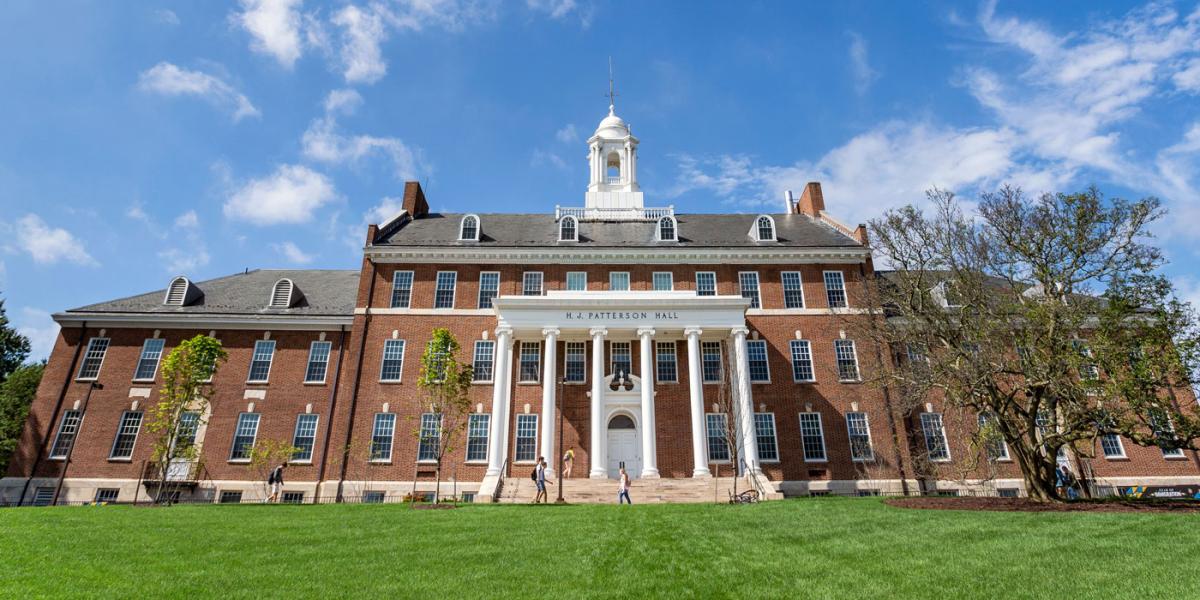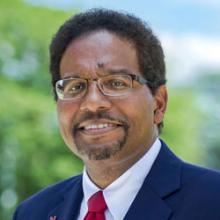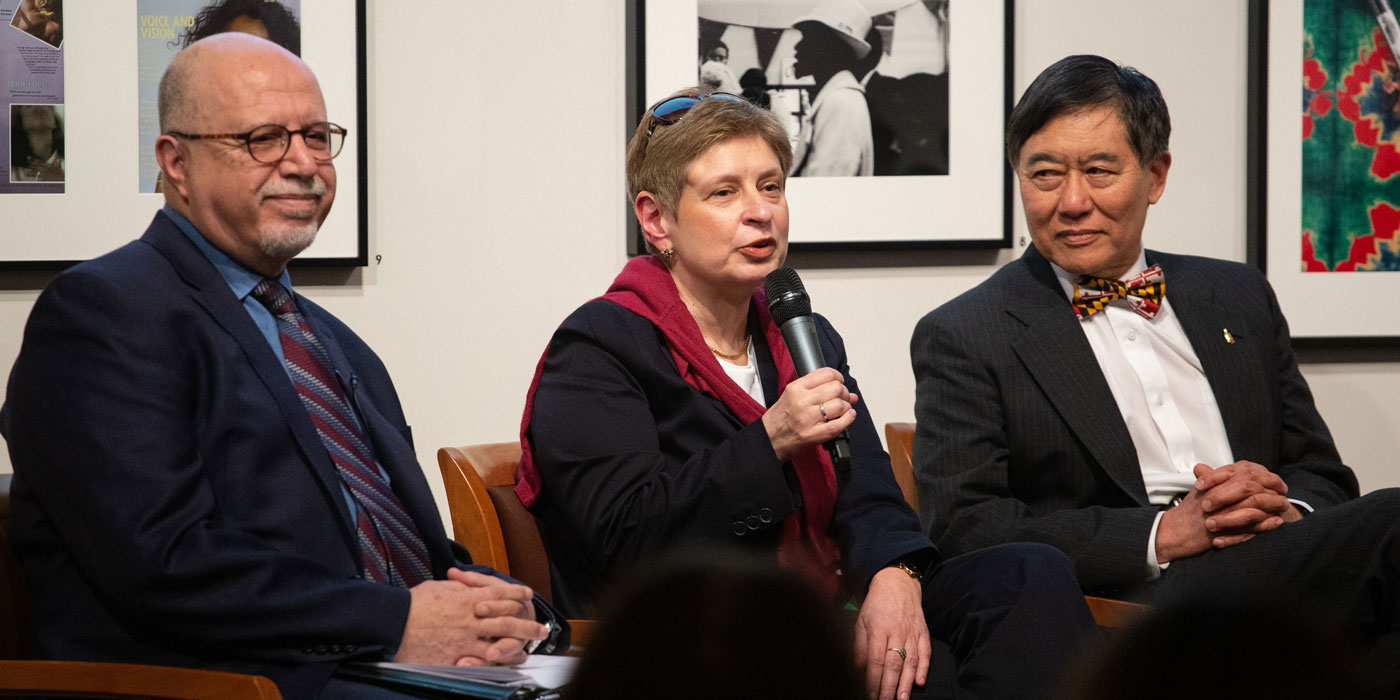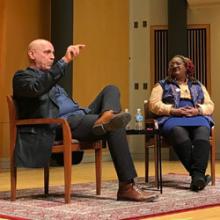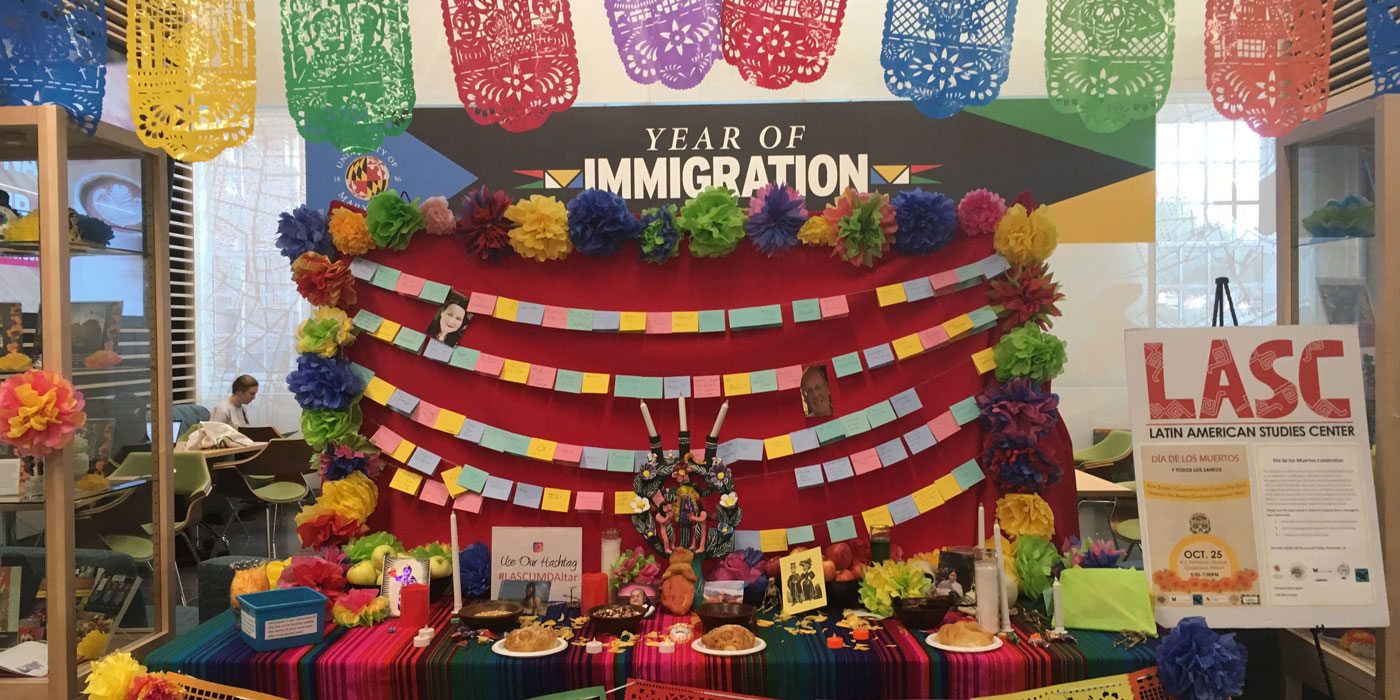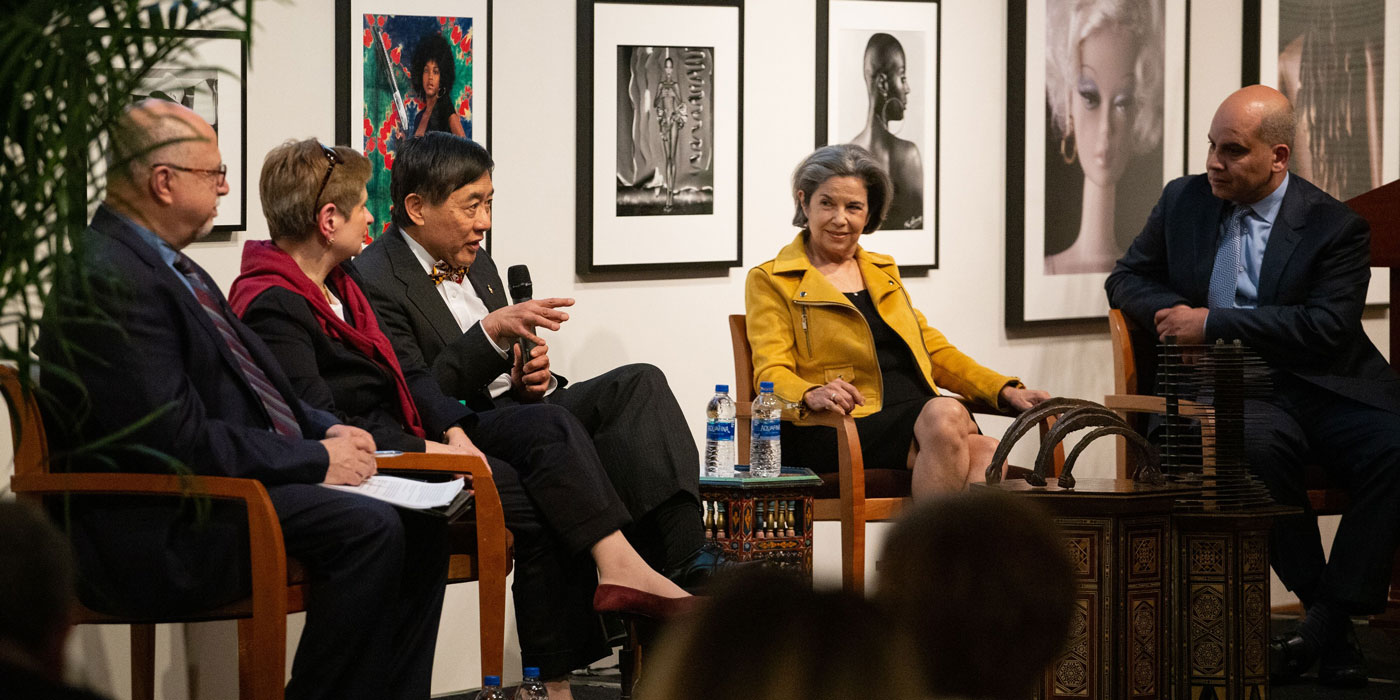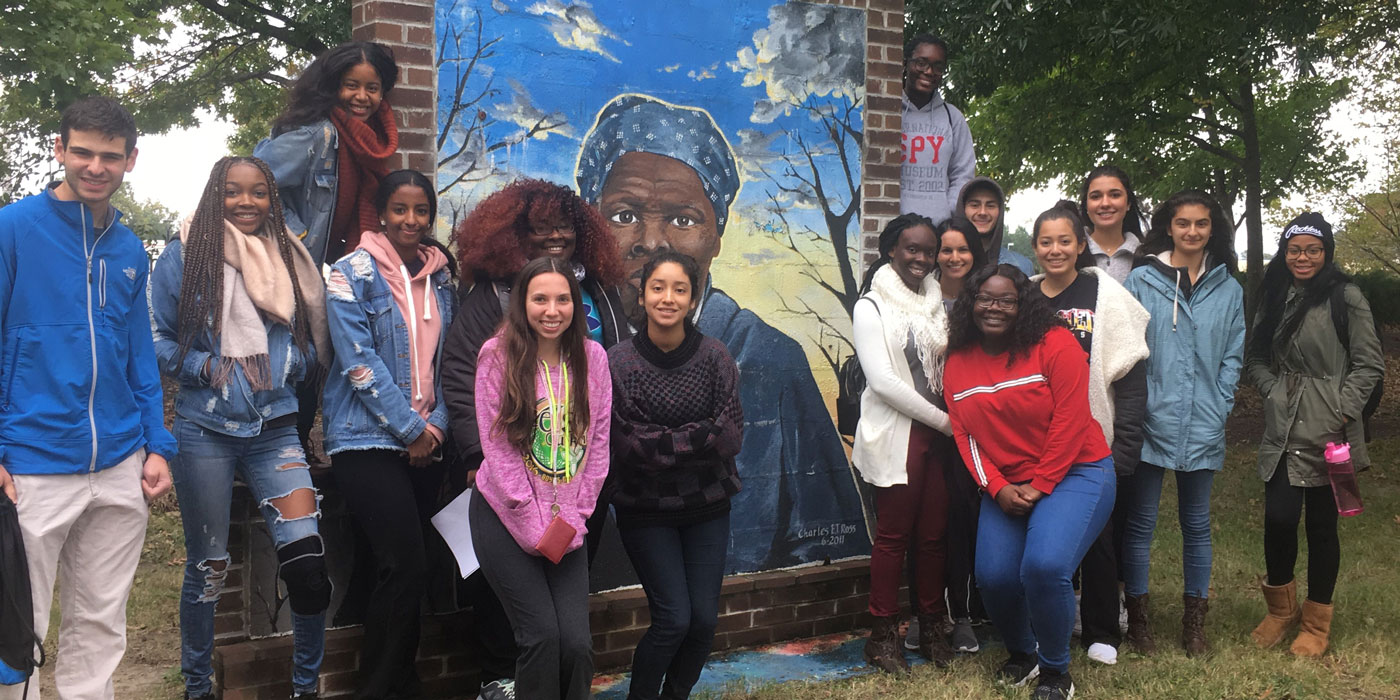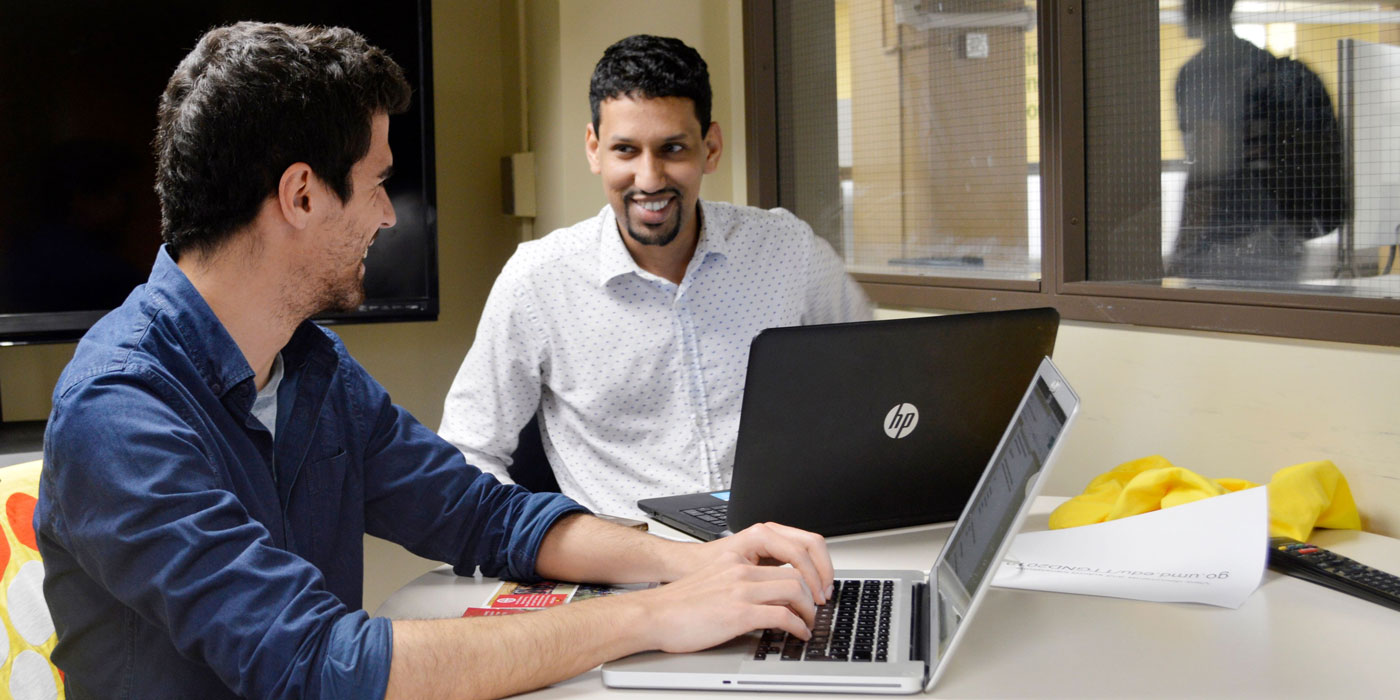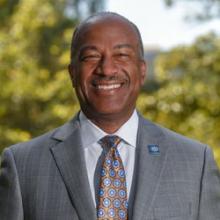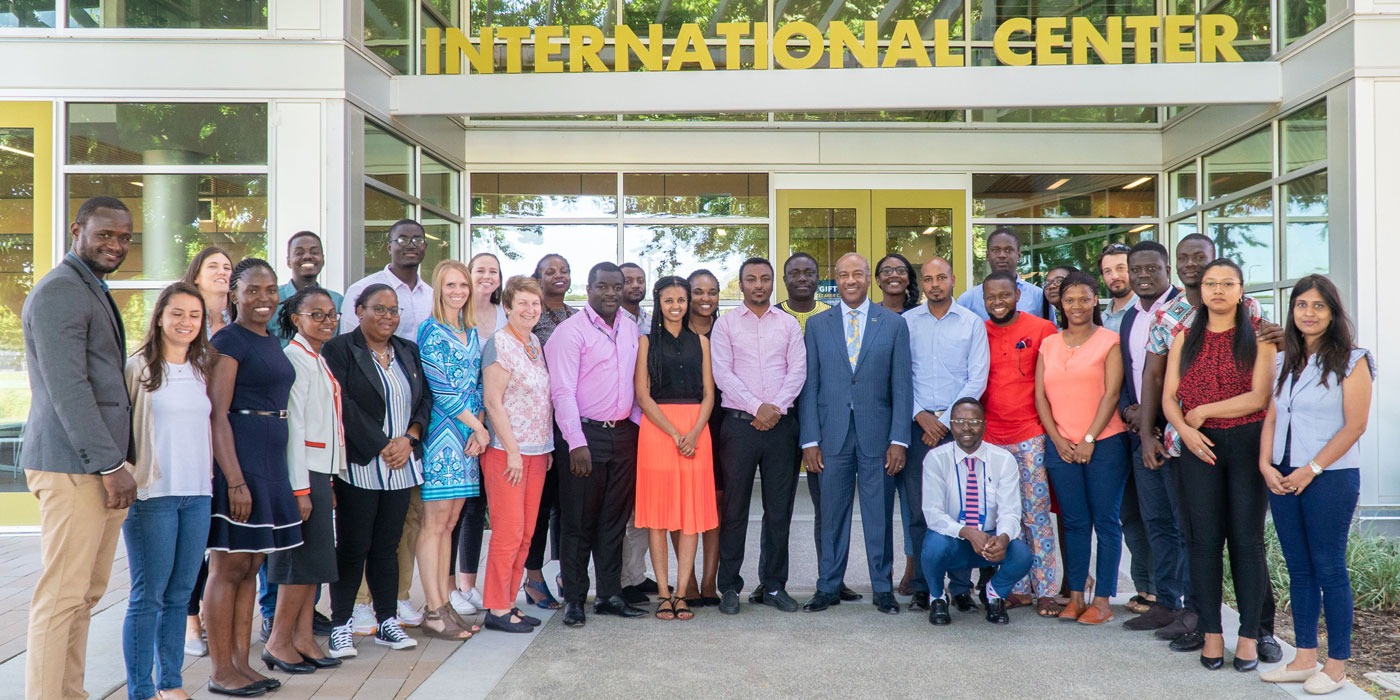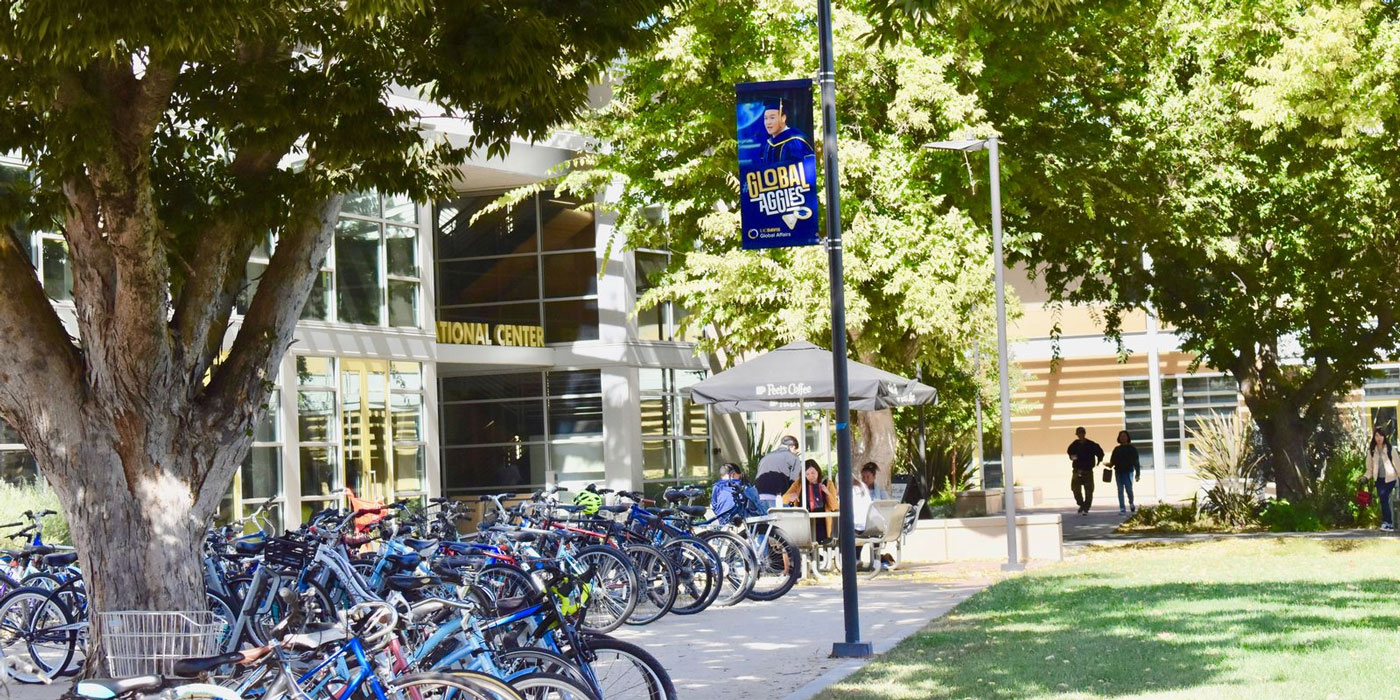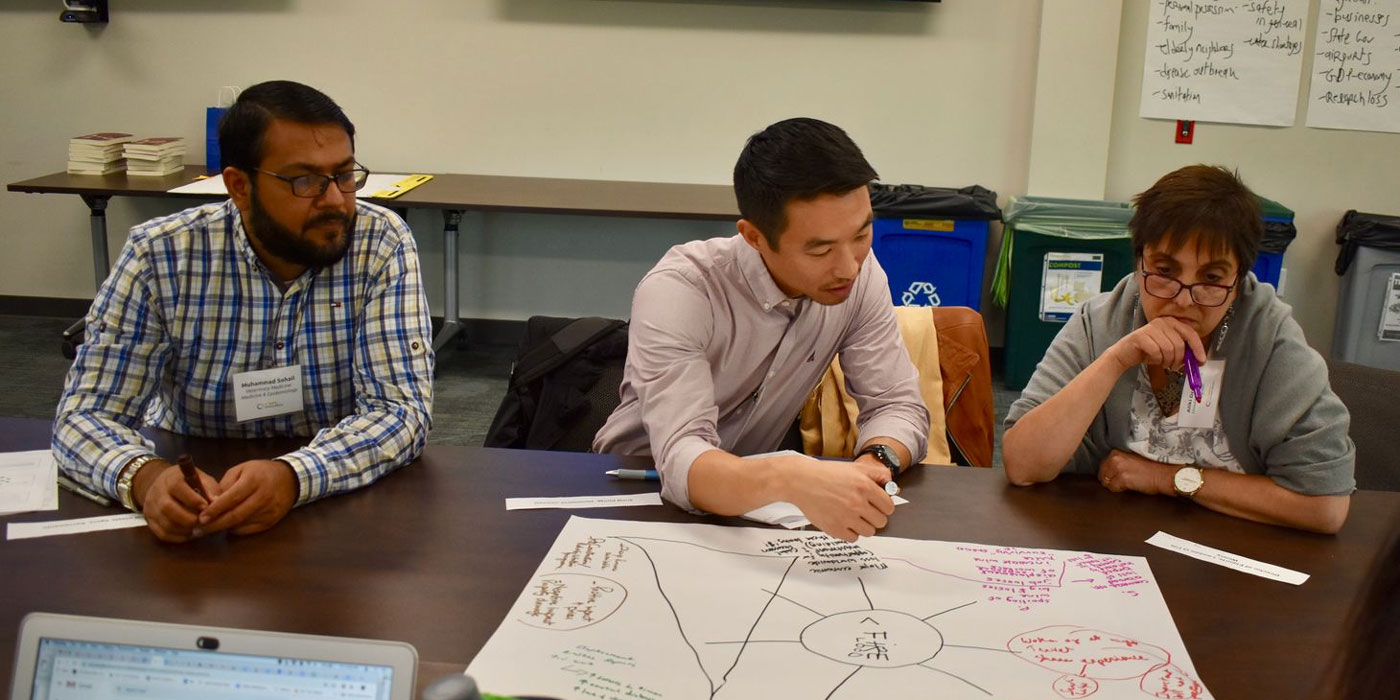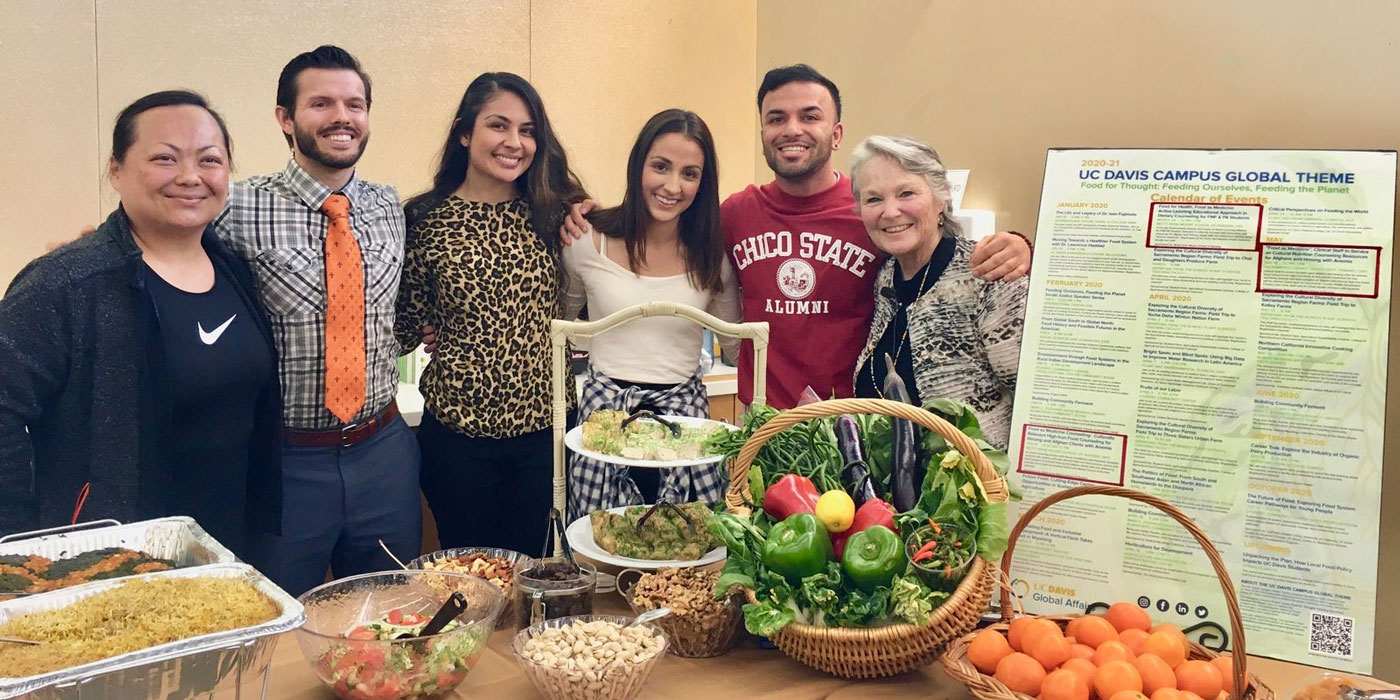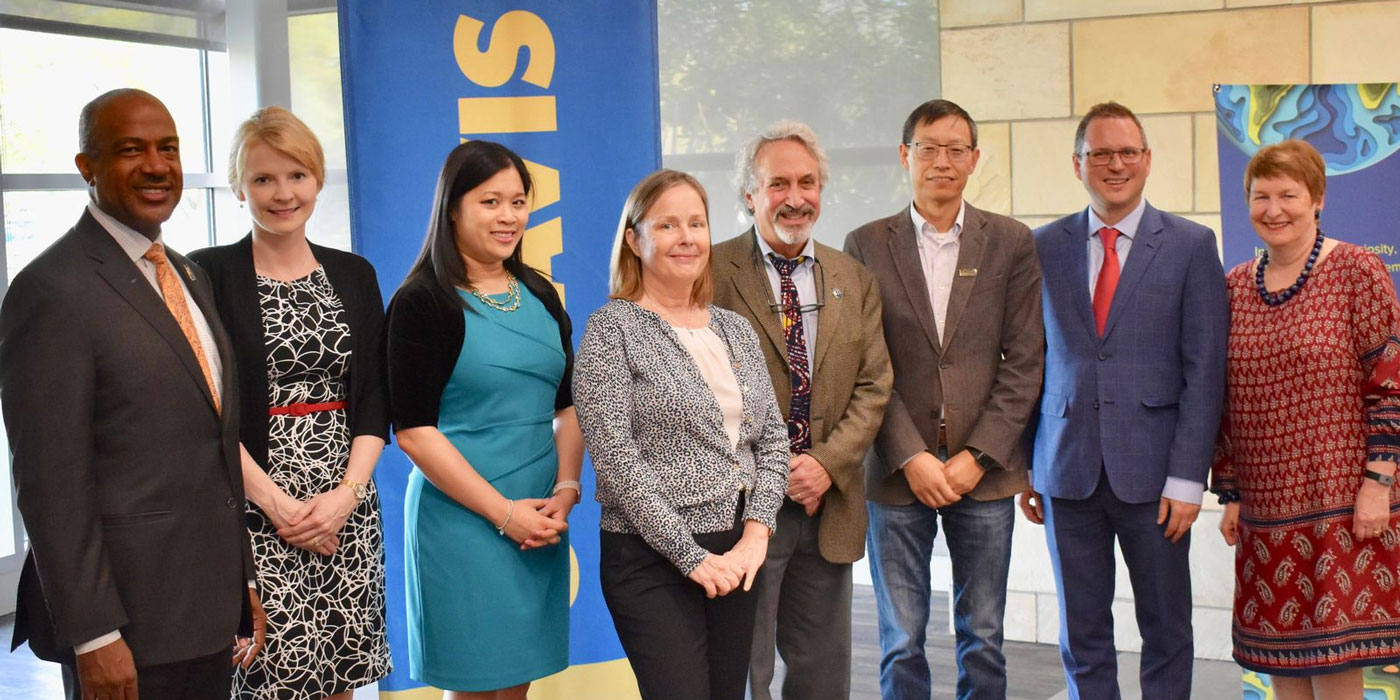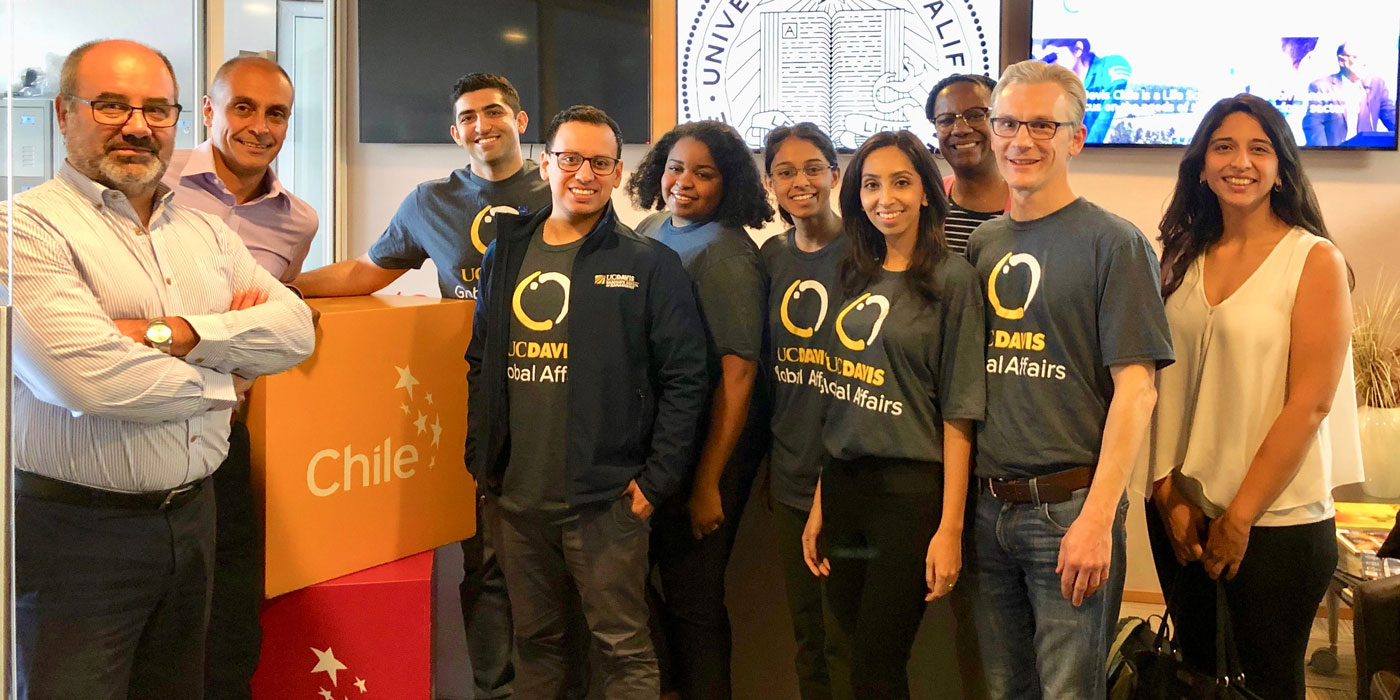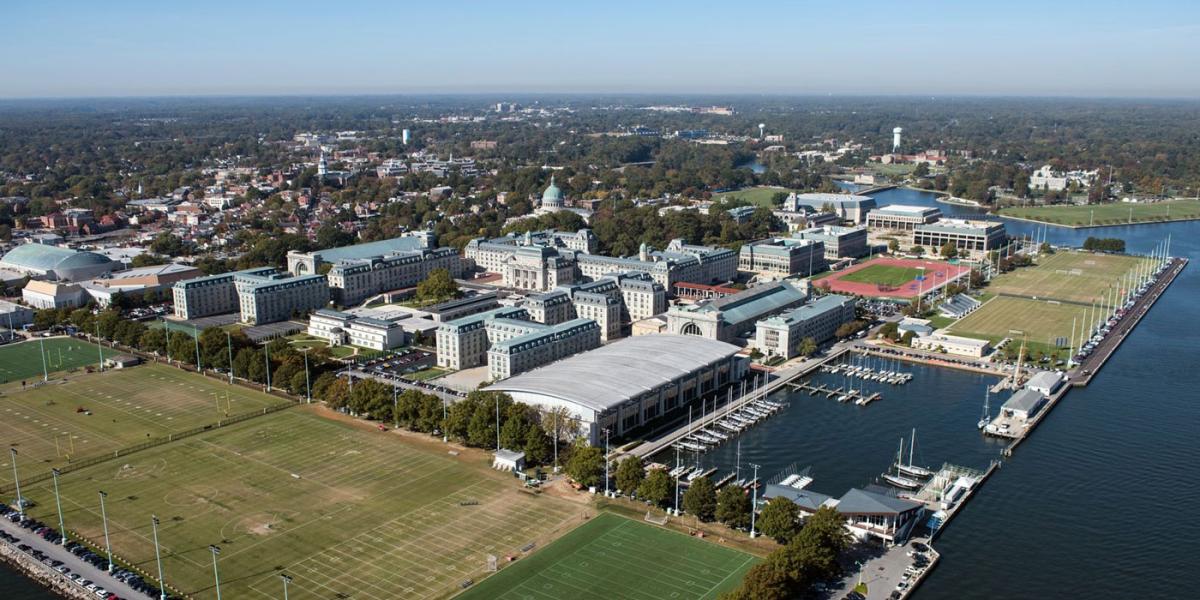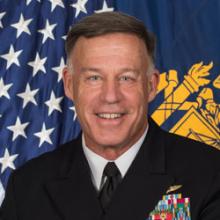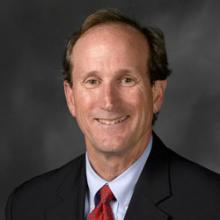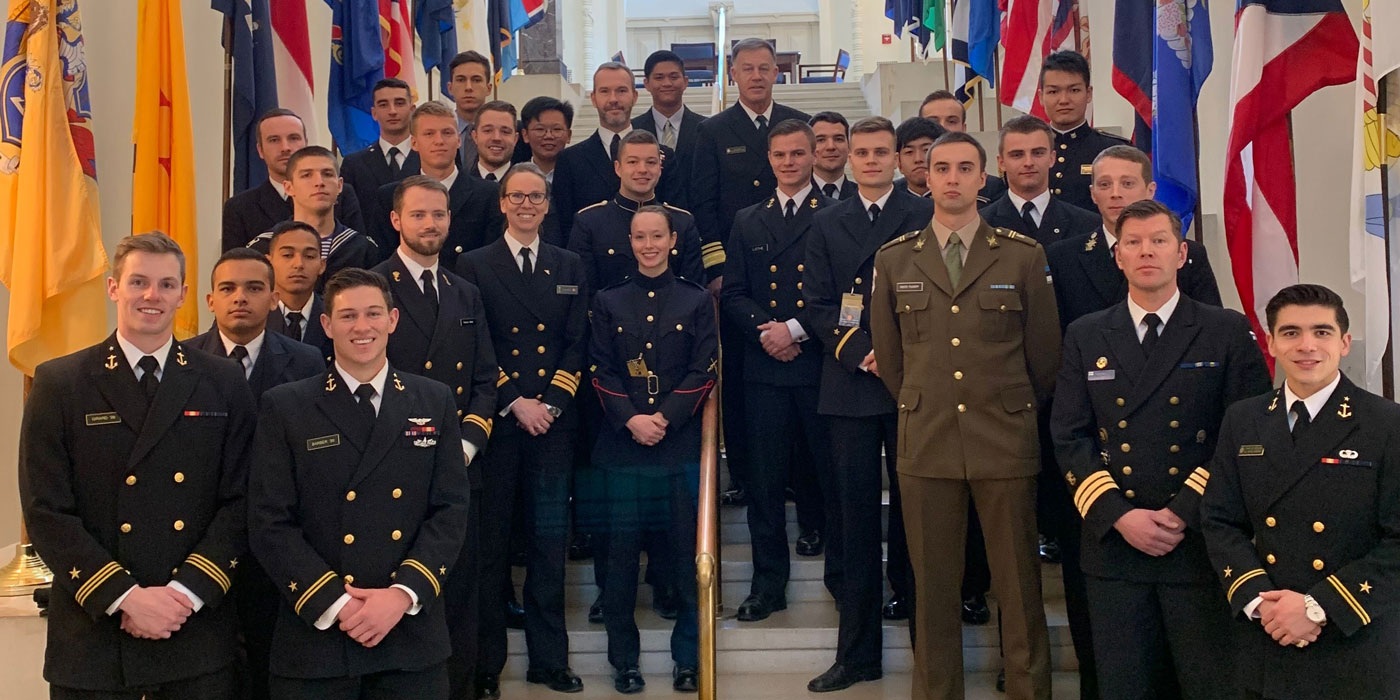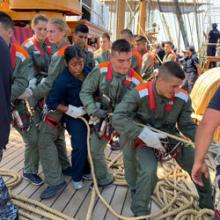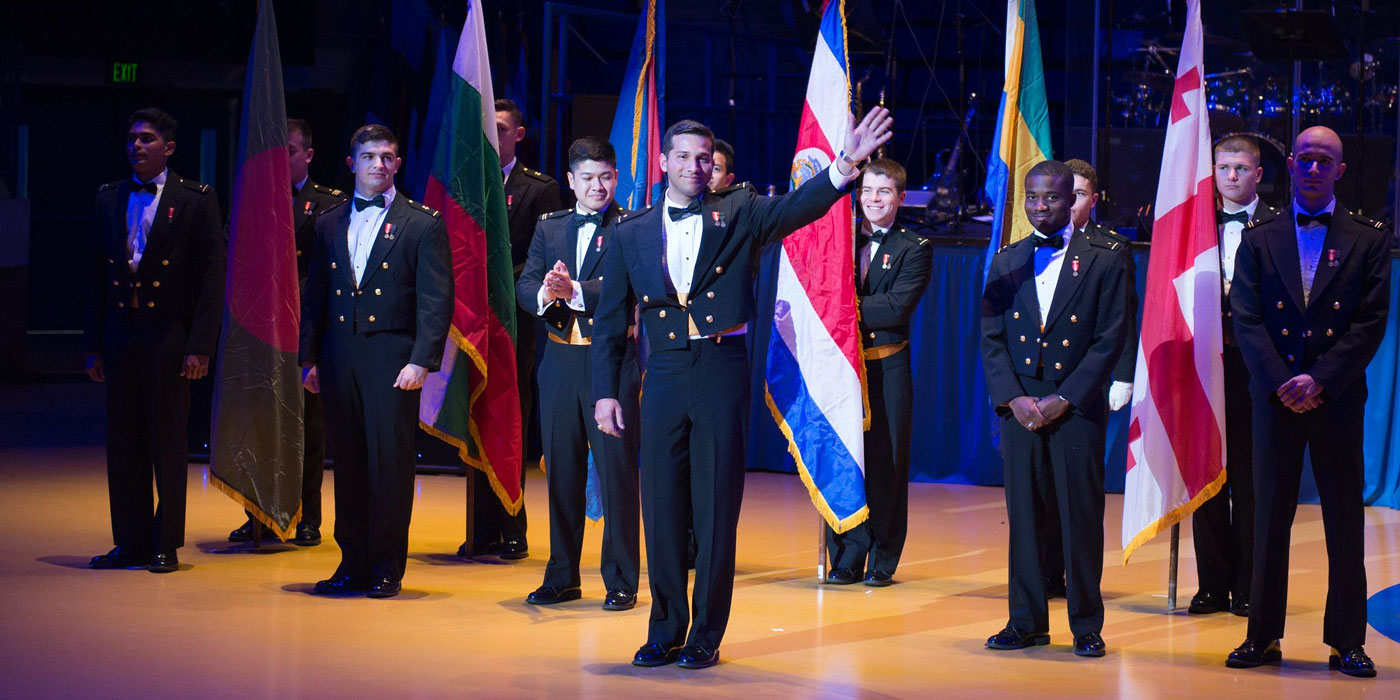Inclusion and Equity
NAFSA Award for Impact in Diversity, Equity, and Inclusion in International Education
Diversity in Hiring Practices
Creating Inclusive Practices for International Students and Scholars to Enhance Wellbeing
2020 Spotlight University of Maryland-College Park
As a campus situated in a community where almost one in four residents are immigrants, the University of Maryland-College Park (UMD) dedicated the 2018–19 academic year to exploring immigration, global migration, and the refugee experience. The Year of Immigration initiative led to more than 75 campus events, nearly 60 academic courses related to immigration, and extensive community engagement with local nonprofits, high schools, and community service groups. The initiative was jointly implemented by the Office of International Affairs (OIA) and the College of Arts & Humanities.
Against a backdrop of rising nationalism and a wave of anti-immigrant policies, international educators at UMD wanted to raise awareness of the issues affecting immigrants and refugees. In 2017, more than 300 international students and scholars at UMD were affected by travel bans implemented by the Trump administration. “That elevated my consciousness,” says Ross Lewin, PhD, associate vice president for international affairs. “I thought we needed to be more cognizant in recognizing that our international community is an extraordinary asset to the well-being of the university community.”
Creating A More Inclusive Campus
With a focus on issues such as immigration, forced migration, and the experiences of refugees, the Year of Immigration was created with a goal of expanding the notion of internationalization to cultivate a more welcoming and inclusive community. “Not only do we have 6,000 international students at the University of Maryland, and more than 1,300 international faculty members, we have countless numbers of international staff members who are working on our campuses every single day,” Lewin says.
After initially partnering with the School of Music in the College of Arts & Humanities, the OIA reached out to academic departments, other university-wide units, and undergraduate and graduate student governments. “The advantage of working with OIA was that because it is a central, campuswide unit, it could really give [the initiative] broad publicity and invite other colleges to participate in different ways,” says Bonnie Thornton Dill, PhD, dean of the College of Arts & Humanities.
The Year of Immigration boasted educational, cultural, and community engagement events and activities. For example, all first-year students read The Refugees by Pulitzer Prize-winning Vietnamese American novelist Viet Thanh Nguyen. Nguyen was invited to campus to speak as part of the College of Arts & Humanities Dean’s Lecture Series and also visited with students in individual Department of English classes. The School of Music also sponsored a yearlong festival featuring music and performances from around the world, such as the work of German American composer Kurt Weill. On-campus dining facilities also developed menus that included international cuisine.
Graduate student Anne Marie Shimko Corwith, who recently defended her PhD dissertation in international education, coordinated a three-hour Human Rights Day event in November 2018, with speakers who discussed efforts to support refugees abroad, barriers for refugees integrating into the United States, and the experiences of undocumented students at UMD. Corwith says that she personally has been able to continue working with several of the organizations that were involved in the event.
Professor Shibley Telhami, PhD, organized several events during the year that built on his own expertise as the Anwar Sadat Professor for Peace and Development. He organized a panel in March 2019, “The Global Response to the Refugee Crisis,” featuring Nancy Lindborg, MA, president and CEO of the United States Institute of Peace; Eric Schwartz, JD, president of Refugees International; and Her Excellency Dina Kawar, MA, the Jordanian ambassador to the United States. In addition, Telhami moderated a panel, “Immigrant Stories,” sponsored by the Carnegie Corporation, during which several immigrants shared their stories of coming to the United States. The panel included former UMD President Wallace Loh, PhD, who was born in China and then sought political asylum with his family in Lima, Peru, before coming to the United States to attend college.
Engaging the Local Community
The Office of Community Engagement focuses on connecting the university to the surrounding community. The office organized events for the Year of Immigration initiative, such as “Be Seen, Be Counted.” This event brought together nearly 60 nonprofit leaders, elected officials, government entities, business owners, designers, and members of the UMD community to learn how to apply a design thinking process to address hard-to-reach and undercounted populations in Prince George’s County and surrounding neighborhoods in advance of the 2020 U.S. census. The goal was to help stakeholders brainstorm ways in which they might better solicit participation from underrepresented populations in the census so that the resulting data would better reflect the county’s needs for public resources.
The Office of Community Engagement also launched Terps Translate, a project that recruited multilingual student volunteers to provide free interpretation and translation services of nonlegal materials at campus and community events. “The Year of Immigration gave us this outlet to highlight the importance of who our neighbors are,” says Gloria Aparicio Blackwell, MS, director of community engagement. “We don’t have to travel abroad just to learn about other cultures—we have [that opportunity] across the street.”
Dill says the Year of Immigration brought new focus to much of the work that was already being done in the College of Arts & Humanities. It also gave new impetus to the college’s global engagement requirement. All majors in the college must meet the requirement through language study, semester study abroad, or an individually designed experience that achieves the learning outcomes of the global engagement requirement. A number of courses from UMD’s Global Classrooms Initiative—virtual, project-based courses offered through OIA in collaboration with partner universities abroad—were also developed around themes related to the initiative. “The impact of the Year of Immigration on the college was to amplify the work we do, encourage its expansion, and build community connections and make them part of our ongoing curriculum,” Dill says.
Internationalizing With the Sustainable Development Goals
Since the Year of Immigration, there has been a renewed focus on expanding internationalization on the UMD campus. The OIA is currently developing a new international strategic plan that will be framed around the United Nations Sustainable Development Goals (SDGs). In 2021–22, OIA is planning a themed year centered on SDG 10: Reduced Inequalities. This next themed year dovetails with the intended focus on inclusivity at UMD, emphasized by President Darryll J. Pines, PhD.
Reflecting back and looking ahead, Lewin says, “The Year of Immigration put wind at our backs and really distilled our own vision of how we want to advance internationalization at the University of Maryland moving forward.”
University of Maryland-College Park
2020 Comprehensive University of California-Davis
Global Affairs at the University of California-Davis (UC Davis) works across disciplinary boundaries and promotes global opportunities for students, staff, and faculty. A commitment to sustainability—as well as diversity, equity, and inclusion—is woven throughout global learning, international student and scholar services, teaching, research, and partnerships.
As a major research university just 15 miles west of the California state capital of Sacramento, UC Davis has always been engaged internationally. In 2009, the institution won the NAFSA Senator Paul Simon Spotlight Award for its efforts to build connections in the Middle East and Cuba. When Ralph J. Hexter, PhD, became provost and executive vice chancellor at UC Davis in 2011, he wanted to expand the institution’s commitment to comprehensive campus internationalization.
“As I got to know the campus, I became aware of the tremendous number of engagements that were occurring all across the campus in international research and study,” he says. “It was really important to me that we have an office whose singular mission is to focus on the global.”
Hexter, who retired in July 2020, oversaw the establishment of Global Affairs in 2014 and brought on Joanna Regulska, PhD, vice provost and dean of global affairs, as senior international officer in 2015. With strong existing programs and enthusiasm across the university, Global Affairs has helped usher in a new era of global engagement at UC Davis.
When she first came to UC Davis, Regulska found a collaborative community ready to partner on a more comprehensive and accessible model for internationalization. “What we did is build up more expansive academic programs in order to serve and engage with the campus more broadly,” she says. “Building on what had already been done, we moved from an earlier definition of internationalization as mobility and individual faculty involved in research to seeing internationalization as advancing research, teaching, and service missions of the university.”
Strategically Growing Global Affairs
Under Regulska’s leadership, Global Affairs has brought together several different initiatives within the same building, the International Center, under two main pillars of units: (1) Academic Programs includes Asian International Programs, Faculty Programs, International Agreements, Partnerships, Visits, and the UC Davis Chile Life Sciences Innovation Center in Santiago; (2) Global Education and Services includes the Global Learning Hub (supports study abroad, study away, global experiential learning, and global leadership programs), Global Professional Programs (brings international fellows, leaders, and scholars to campus for professional development and collaboration), Services for International Students and Scholars, and UC Davis Arab Region Consortium.
Global Affairs has grown quickly—and strategically—since Regulska came on board. Since 2015, Global Affairs’s budget has increased by 115 percent to $18.3 million, and its team has grown by 40 percent to 78 full-time professional, academic, and student staff. Regulska created new positions, such as a dedicated communications director, an international agreements manager, and a travel security manager, which led to the first travel security policy among the 10 University of California campuses.
The results are tangible. UC Davis was a top producer of Peace Corps Volunteers in 2020, Fulbright U.S. Scholars in 2019–20, Benjamin A. Gilman International Scholars in 2016–17 and 2018–19, and Fulbright U.S. Students in 2017–18. Between 2014 and 2019, UC Davis also grew its international student population from around 4,000 to more than 8,000 international undergraduate and graduate students. In the 2019–20 academic year, the university had the 10th largest international scholar population and 18th largest international student population in the United States, according to the Institute of International Education’s 2019 Open Doors report.
UC Davis is one of 13 institutions in the United States that host the Hubert H. Humphrey Fellowship Program for young- and mid-career professionals. This program at UC Davis has convened 296 fellows from 105 countries focused on agriculture, rural development, climate change, and natural resource management. In addition, the campus has brought 99 fellows from 34 different countries in Africa to Davis through the Mandela Washington Fellowship for Young African Leaders.
Building Partnerships Across Campus
Centralizing Global Affairs into a single division has helped build connections across the UC Davis campus. Part of that comes from a recognition that many people will be referred to Global Affairs by other units, such as academic departments, the Office of Sustainability, or the Office of Diversity, Equity, and Inclusion.
One way that Global Affairs is helping to break down silos across the campus is through its Global Strategy Advisory Committee, which brings together associate deans from all colleges and professional schools. The committee is tackling higher-level policy issues, such as developing guidelines for faculty who want to apply for Fulbright and other prestigious awards or establishing processes for international agreements and international delegation visits.
“We’ve done a lot to really standardize our agreement process and make it very legible and easy for faculty who are interested in bringing their collaborations to the next level with an official university agreement,” says Michael Lazzara, PhD, associate vice provost of academic programs.
Templates and step-by-step outlines of the agreement process are published on the Global Affairs website, which has allowed the university to better understand the range of partnerships with institutions abroad. “Whereas agreements were housed in different areas around the university in the past, we’re working to aggregate that data and bring it all together so we really have a full picture of all of the collaborations that are happening,” Lazzara added.
Beth Greenwood, JD, associate dean for international programs, represents the UC Davis School of Law on the Global Strategy Advisory Committee. She says that centralizing international initiatives under Global Affairs has been beneficial for everyone: “What we’re doing in the law school impacts Global Affairs, and what Global Affairs is doing impacts the law school. And working together, it really makes it possible to do more than we could do on our own.”
Promoting Global Education For All
After Chancellor Gary S. May, PhD, was appointed in 2017, international and global perspectives were woven throughout the new 10-year strategic plan “To Boldly Go.” Subsequently, a campuswide committee made up of representatives of every college and school, campus units, and students has been tasked with developing the first-ever global strategic plan to be completed during the 2020–21 academic year. The strategic plan will provide a guide for global strategies for education, research, diversity and inclusion, and partnerships.
“The charge of the committee is to formulate a campuswide plan on how to engage globally with the vision of advancing global good in California and the world,” says Fadi Fathallah, PhD, associate vice provost of global education and services and committee co-chair.
One of the areas of focus within “To Boldly Go” is Global Education for All, which aims to provide all UC Davis students—more than 39,000 undergraduate, graduate, and professional students—with a global learning experience before they graduate.
“The short story about Global Education for All is that we want all of our students to have an experience that’s global in nature, whether that be study abroad, research abroad, service abroad, work abroad, or having an experience here locally that connects them to another culture,” May says.
There are a number of reasons why students may be unable to travel abroad, including family and work responsibilities and finances. The COVID-19 pandemic has given new urgency to the idea of Global Education for All at a time when international travel is off the table.
The COVID-19 response has helped spotlight the possibilities for global learning via technology. “As much as COVID-19 is a terrible pandemic, this is a moment to realize how global learning is critical for everybody,” Regulska says. “We are improving accessibility to global learning by shifting away from mobility and thinking about other strategies we can use to provide global experiences for students.”
Hexter made the Global Education for All initiative a “provost’s priority,” which has signified the importance of this initiative and helped with fundraising across campus. Forty-two percent of UC Davis undergraduates are first-generation college students, and 38 percent are eligible for Pell grants. “We want to make sure that when we offer a program like this, students from every background can take advantage of it,” Hexter says.
Nancy Erbstein, PhD, associate vice provost of Global Education for All, added that global learning “helps cultivate a sense of community on campus, which we know is really key in fostering more equitable educational outcomes.”
The initiative includes academic programs, international and domestic experiential opportunities, and co- and extra-curricular activities related to global issues, systems, and perspectives. Local opportunities include, for example, a global living and learning community. The Intercultural Programs team also provides intercultural training workshops to different groups on campus who have an interest in global issues. Examples include a mentoring program for incoming international students and an effort to educate international students on the historical context for diversity, equity, and inclusion initiatives.
Fostering Global Education in and Outside the Classroom
One of the ways UC Davis is encouraging faculty to include global perspectives in their courses is through its Curriculum Enhancement Through Global Learning program, through which more than 30 faculty from 25 different departments have revised their courses over the past 2 years.
As part of the Curriculum Enhancement Through Global Learning program, faculty participate in monthly workshops during the fall and winter quarters. Each faculty works on a syllabus and integrates global learning outcomes developed by Global Affairs. The three outcomes are (1) building global awareness, (2) engaging in cultural diversity, and (3) acting globally. A campuswide Global Education for All Steering Committee, which includes faculty, staff, students, and administrators, adapted the outcomes from the Association of American Colleges & Universities’s (2014) Global Learning VALUE Rubric.
“Our working global learning outcomes framework is a cornerstone of Global Education for All,” Erbstein says. “It reflects skills, knowledge, and understandings that we’d like students to develop while at UC Davis, because they’ll help graduates thrive in our interconnected world and collaboratively and equitably address global challenges.”
Aliki Dragona, PhD, faculty director of academic programs in the Global Learning Hub, teaches an upper-division writing class for students going into the medical field. She has been revising assignments to match them to the global learning outcomes. “How do you raise awareness? How do you encourage diversity? How do you encourage global action?” she says. “It has been a very productive and enriching experience to think globally about the curriculum that you’ve been teaching for a while.”
Guided by the internationalization values inherent to UC Davis’s mission, the Global Learning Hub coordinates study, experiential learning, and leadership opportunities abroad, in the region, and on campus. “The hub connects students to opportunities that include, but go beyond, movement of students around the world. The work we do is a holistic approach that provides learning regardless of location,” says Zachary Frieders, MA, executive director of the Global Learning Hub.
In addition to more than 50 different types of study abroad and hybrid programs, including quarter abroad programs and shorter seminar programs, the Global Learning Hub oversees in-demand internships in seven disciplines in 18 different locations, both in the United States and abroad. Students who are located at internship sites around the world take a two-credit online reflective course with a UC Davis faculty member, based on discipline, to provide deeper context through discussions, readings, and assignments and better link the work to the area of study and future career endeavors.
Erbstein’s hybrid program, Community, Technology, and Sustainability in Nepal, focuses on community and regional development. Students take part in virtual seminars throughout the fall quarter, and UC Davis students work in interdisciplinary groups with Nepalese peers to complete projects on topics such as sustainable agriculture, water resources, disaster reconstruction, food and nutrition, education, and public health. Over winter break, the UC Davis students travel to Nepal for 3 weeks. “They meet their Nepali counterparts, and go out to the community and meet their community partners, and work on their project implementation,” Erbstein says.
On campus, a new Global Learning Conference supports students in leveraging all types of global experiences to enhance their future academic or professional careers through workshops, career skill sessions, and networking.
Building A Sustainable, Global Framework
Another example of how UC Davis has implemented Global Education for All is the launch of a campus global theme inspired by the United Nations Sustainable Development Goals (SDGs). The inaugural theme is “Food for Thought: Feeding Ourselves, Feeding the Planet.” Global Affairs awarded small grants to 19 faculty from across campus for events and activities, such as documentary screenings and research projects on topics including nutrition, agriculture and economics, and education and ecosystems.
The Betty Irene Moore School of Nursing has received a grant to investigate how food can be used to treat iron deficiency anemia in high-risk immigrant and refugee populations. “We actually developed that as an active learning session into the curriculum under gastroenterology,” says Laura Van Auker, DNP, an assistant clinical professor of health sciences.
The SDGs provide a common framework for thinking about global problems and solutions that tie into UC Davis’s mission as a land-grant institution, says Jolynn Shoemaker, JD, director of global engagements. “Faculty are already really engaged in a lot of this work,” she says. “One thing that has been very valuable about this agenda is that it naturally links the local, regional, domestic, and international levels.”
Shoemaker adds that the SDGs support the university’s work in diversity, equity, and inclusion. “The SDG agenda is rooted in the concept of addressing root inequalities,” she says. “That really cuts across all of the work in different disciplines that is contributing to individual SDGs as well,” she says.
UC Davis Director of Sustainability Camille Kirk, MA, says that the SDG agenda also puts focus on the social and economic aspects of sustainability, not just the traditional idea of environmental sustainability. Global Affairs created an SDG internship in 2020 to provide students with the skills needed to address global challenges.
Anthropology and international relations major Christal Juarez is one of the first SDG interns. Her job is to help figure out ways that UC Davis can further engage with the SDG agenda. “As a first-generation student, I understand very clearly that not everybody has the opportunity to do things globally in a physical sense,” she says. “And so applying SDGs as a global framework is really important to give that opportunity to students. Because they can really innovate...while being in their own community in Davis.”
“One thing that is really blossoming here is the whole idea of helping students, faculty, and staff connect what they’re doing to global challenges...through the sustainable development framework,” says Robb Davis, PhD, director of intercultural programs and former mayor of the city of Davis. “It’s been really, really helpful to encourage people to talk about global challenges in the context of their own discipline.”
Engaging and Supporting Faculty and Staff
Efforts to further engage faculty and staff in internationalization include the Global Affairs Faculty and Staff Ambassador Program, which provides funding for faculty and staff to engage with partners, students, and alumni while they are abroad, and the Chancellor’s Awards for International Engagement, which recognizes faculty and staff who go above and beyond in their international engagement and efforts to help meet the goals of the Global Education for All initiative. A formal awards ceremony and networking event, known as International Connections, brings together hundreds of globally-engaged faculty and staff to recognize their work and spur future collaborations.
Faculty have also been able to leverage seed grants for international research as well as curriculum innovation and other global learning opportunities. They have offered a significant return on investment. “The seed grants have enabled faculty to raise almost 40 times the amount [we invested] in combined resources from other funding entities,” Hexter says.
Global Affairs has also been helpful in bringing together faculty from different colleges to collaborate on research projects. Ermias Kebreab, PhD, associate dean of global engagement for the College of Agricultural and Environmental Sciences, says that Global Affairs runs a database that allows them to find colleagues who have relevant expertise. For example, he and his team were working on a grant application for the U.S. Department of Agriculture for a project in Kenya, and they were able to connect with other UC Davis researchers who work in Kenya. “It has a big impact in terms of us being more competitive,” Kebreab says.
Expanding Partnerships and Research Through Global Centers
One of the ways that UC Davis is extending its global reach and advancing mutually beneficial partnerships and research is through the launch of global centers in strategic regions of the world. The first global center will further existing partnerships in Latin America and the Caribbean by, for example, building on strong ties through the UC Davis Chile Life Sciences Innovation Center in Santiago. Founded in 2015, UC Davis Chile is cosponsored by the Corporación de Fomento de la Producción (Production Development Corporation).
The original collaboration was focused on the wine industry, says Lovell “Tu” Jarvis, PhD, executive director of UC Davis Chile Life Sciences Innovation Center. UC Davis has been able to partner in areas such as wine management, plant diseases, and irrigation. In addition, UC Davis researchers have started working with Chilean organizations on environmental issues. One project focuses on mechanisms to improve water quality in Chilean lakes, based on collaborative work done at Lake Tahoe in California.
Global centers have become a central part of the university’s internationalization strategy going forward. Building on an extensive network of relationships, UC Davis is expanding and enhancing collaborative academic and research opportunities as well as alumni connections around the world.
UC Davis is now looking to establish partnerships in other regions of the world, especially Africa, because a large number of faculty members are already engaged in research in African countries. UC Davis also has hundreds of connections with alumni of the Mandela Washington and Humphrey Fellowship programs. “Global centers enable us to have our expertise in various disciplines connected more directly to our colleagues in other parts of the world—and vice versa. We rely on connections and partnerships around the world to provide opportunities for our students, faculty, staff, and alumni,” May says. “Global centers also allow us to partner with local experts, communities, and institutions to build mutually beneficial collaborations.”
“Moving ahead, UC Davis is uniquely positioned to build upon past successes and continue connecting our entire university community to the world,” says Provost and Executive Vice Chancellor Mary Croughan, PhD, who was appointed in July 2020.
2020 Comprehensive United States Naval Academy
Founded in 1845, the United States Naval Academy (USNA) has a long history of international engagement with allies and partners abroad. Students—known as midshipmen—gain global leadership and intercultural competence through semester-long exchanges, faculty-led programs, language study, and cocurricular activities focused on global issues. Serving 4,500 students at its campus in historic Annapolis, Maryland, the Naval Academy also hosts international officers as part of its faculty and international students from partner militaries around the world.
Before Lieutenant Commander Josh Duran enrolled at USNA in 2005, he had never had any international experience. The summer after his second year of college, he spent 4 weeks on a Japanese ship, where he lived and trained alongside newly commissioned Japanese naval officers. Thirteen years later, he is still in touch with several of the people he met on the ship.
The next summer, he spent 1 month in Kumamoto, Japan, learning more about the language and culture. “I don’t know that I completely understood how important both of those experiences were as a military officer,” Duran says. “I looked at them as fun and educational experiences, but I didn’t really have an understanding yet as to how they would impact me.”
Once midshipmen graduate from the Academy, they are commissioned as officers in the Navy or Marine Corps and sent to various locations around the world to enhance their global learning. Duran did his first tour of duty in South Korea. While he faced the challenge of learning yet another language, his previous opportunities to develop intercultural skills prepared him well. “I had a really good foundation for how to engage with my Korean partners who I needed to work with on a daily basis and also [understood] what sorts of things would be meaningful to do in order to establish lasting relationships with them,” he says.
After spending 8 years working as a naval intelligence officer, Duran was then appointed as an exchange officer at the Republic of Korea Naval Academy, where he teaches a diverse offering of English language courses to South Korean midshipmen. “The foundation for my career was built in Annapolis, and it has just been kind of an inimitable part of my career to date,” he says.
Centralizing International Programs
Since 2005, the International Programs Office (IPO) at USNA has created opportunities for midshipmen to excel in the global leadership and learning required for a career in the Navy or Marines. “They need to be ready from day one to be able to be a leader and work with others [who] have differing points of view,” says Tim Disher, MBA, director of international programs.
Disher, a former Navy officer, is also the product of the Naval Academy. Over the course of his military career, he served on a submarine during the Cold War and spent 4 years in Spain, where he acted as a liaison between the U.S. and Spanish Navies and advised senior Navy and State Department leadership. Disher’s experience in Spain paved the way for him to become the Naval Academy’s first senior international officer.
After returning to Annapolis in 2003, Disher helped establish the IPO in 2005 at the behest of Superintendent Vice Admiral Rodney Rempt. As the institution’s top leader, Rempt was interested in increasing midshipmen’s global engagement in response to the U.S. Department of Defense’s priorities to improve foreign language proficiency, regional understanding, and cultural appreciation for officers and enlisted personnel, following the tragedies associated with the attack of the USS Cole off the coast of Yemen in 2000 and the September 11, 2001, terrorist attacks. Disher continued as IPO director as a civilian after retiring from the military in 2007. “I knew that future generations of officers...are going to have to be engaged globally,” he says. “And I wanted to be involved with that.”
As of 2020, the office has eight staff members and manages international student services, study abroad, student exchange, and international visits and works with 10 international exchange officers from partner navies around the world.
The interdisciplinary Center for Regional Studies (CRS) was established at the same time as the IPO, with the mission of helping midshipmen understand regional and international dynamics across the world through regional speaker events focused on different geographic areas: Africa, Asia Pacific, Eurasia, Latin America, and the Middle East.
Every year, CRS Director Ernest Tucker, PhD, a professor of Middle Eastern history, coordinates more than 20 international speakers who present to the student body. Altogether, these lectures reach thousands of students. Speakers include diplomats, scholars, musicians, poets, journalists, and representatives of foreign navies. The speaker events do not have an academic component, but many professors weave the presentation topics into their courses. “Talking across disciplines is a key responsibility of CRS,” Tucker says.
Building On A Legacy of Internationalization
Current Superintendent Vice Admiral Sean Buck, MA, says that he has been able to build on the robust international portfolio inherited from his predecessors, who rotate approximately every 4 years. He has helped make the case for internationalization based on his own recent experience as commander of all U.S. Naval forces that operate in the Caribbean, Central America, and South America.
Buck says exposure to diverse perspectives is even more important for midshipmen at the beginning of their military careers. “As we try to navigate them through their four-year journey here at the Naval Academy, we’ve come to realize that giving them exposure to other cultures is absolutely paramount so that they can make an impact from day one as leaders,” he says.
Beyond the cocurricular opportunities offered through the CRS and various summer and semester study abroad programs, midshipmen have opportunities for intercultural learning due to the presence of international students and faculty on campus. At any one time, around 60 international students are completing their four-year education at USNA, in addition to 25 semester exchange students from foreign naval academies.
To celebrate the international diversity of the faculty and midshipmen, USNA holds an International Ball every year. The superintendent hosts the event, which is attended by more than 2,800 people annually. It includes dances and events by the various cultural clubs as well as engagement with senior international officers and representatives from the Washington, D.C., embassies. The International Ball would have celebrated its 54th anniversary in 2020 if it had not been canceled amid the COVID-19 pandemic.
Finally, midshipmen gain exposure to global topics through core courses that focus on regions such as Asia or the Middle East, and many electives and major program curricula also have global learning content. In addition to majoring in Arabic and Chinese, students can pursue minors in Arabic, Chinese, French, German, Japanese, Russian, and Spanish. The institution is also in the process of establishing a first-of-its-kind regional studies major for the class of 2024.
Expanding Opportunity Through Education Abroad
Academic Dean and Provost Andrew Phillips, PhD, has been at the Academy for more than 20 years. Although USNA had always promoted international engagement, it was not until the creation of the IPO that education abroad became readily accessible for a large number of students, he says.
One of the obstacles to education abroad at USNA is that the federal law governing service academies specifies that students can only participate in such programs if they will still be able to graduate within 4 years. Phillips says that when he first became provost in 2009, faculty were reluctant to engage with internationalization. “There were some early adopters, but there were a lot of people saying it was too hard, until we showed people what could be done,” he says.
To help address the challenge, the Naval Academy has developed a robust portfolio of faculty-led summer programs as well as exchange opportunities with civilian and military institutions around the world. Now, all 25 majors offered at the Naval Academy boast at least one semester-length education abroad opportunity. Approximately 25 percent of each graduating class studies abroad. According to Disher, the goal is to eventually send 500 midshipmen abroad per year, which would be around 50 percent per class.
Training Leaders Through Experiential Learning
One of the reasons that Jake Lindow, a cyber operations major who graduated in May 2020, chose the Naval Academy was because of its education abroad programs. He wanted to attend a military academy but did not want to give up the experiential learning opportunities offered at civilian institutions. He spent the fall semester of his junior year at the German Naval Academy in Flensburg and the Bundeswehr University in Munich. “A common misconception is the Academy is just a military school where you march around in circles all day,” Lindow says. “That’s very much not the case, and I think the study abroad program is a testament to that.”
Opportunities for education abroad at USNA include semester-long exchanges at naval academies abroad and at civilian institutions for science, technology, engineering, and math (STEM) majors. But the primary vehicles for education abroad are the approximately 50 faculty-led opportunities known as Language, Regional Expertise and Culture (LREC) programs.
Most LREC programs are run in the summer by faculty members who lead small groups of four to six students abroad. Joseph Thomas, PhD, director of USNA’s Stockdale Center for Ethical Leadership, has taken students to several places around the world, including Mongolia, Peru, South Africa, and, most recently, northern India.
“I try to create a learning environment during both the planning and execution phases where students are required to take calculated risks,” he says. “When those risks result in failure, we scrupulously debrief the event and examine what could have been done better.”
In summer 2019, Colonel Maria Pallotta, PhD, director of the Center for Experiential Leadership Development, took a group of eight students to Vietnam for 16 days to study battlefields from the Vietnam War and experience other cultural immersion opportunities. The group visited the demilitarized zone, which divided North and South Vietnam until the war ended in 1975, as well as Hanoi and the Mekong Delta.
Justin Nguyen, who graduated in May 2020 as a quantitative economics major, had both a professional and personal interest in traveling to Vietnam, as his parents were refugees to the United States after the Vietnam War. He was also able to use some of his basic Vietnamese language skills to help the group get around. “I thought this was a really unique opportunity for me to learn about my family history from a different lens,” he says.
History major Elizabeth Fugit says the program to Vietnam helped her understand both sides of military conflicts. “The literature we consume here in America is very much from the American perspective,” she says. “We got to see [the Vietnamese] perspective and their museums and how they saw the conflict.”
Internationalizing STEM Through Language Learning
Internationalization was particularly challenging for the STEM disciplines, in which 65 percent of each graduating class of midshipmen must be enrolled. It was difficult to fit either education abroad or foreign language study into already jam-packed STEM schedules, which are “particularly lockstep in nature,” according to Phillips. The creation of summer immersion programs in Arabic, French, and Spanish was one way students in these disciplines have been able to fit both education abroad and language study into their schedule.
Arabic professor Hezi Brosh, PhD, takes 15 STEM majors to Israel every summer to study Arabic. Students complete 2 weeks of intensive language study in Annapolis before they travel to Israel for 1 month to take part in cultural excursions and study Arabic at the University of Haifa.
Fourth-year student Dallas Elliston first studied Arabic with Brosh in 2019. He had wanted to take a foreign language but was not sure if he would be able to work it into his mechanical engineering schedule.
He says knowing another language will be beneficial for his military career, but being able to understand multiple perspectives through deeper-level intercultural learning—such as various perspectives on the conflict between Israel and Palestine—is even more valuable.
“We have to be there and learn the culture,” Elliston says. “One of the biggest things I gained [was] learning what I see from a Western viewpoint isn’t enough to be able to jump in and give my opinion on how things should be done.”
Efforts to internationalize the sciences at USNA since 2013 have been so successful that a higher percentage of STEM majors than humanities and social science majors now study abroad. Many STEM students who participate in these programs find ways to fit in additional language study once they return to Annapolis.
Building Global Connections in Cybersecurity
The Naval Academy also has one of the first accredited cybersecurity programs in the United States. Captain Paul Tortora, director of the Center for Cyber Security Studies, says that his discipline is particularly conducive to international engagement. He started looking at options for international education opportunities in Estonia, which has become a major cyber defense hub after it faced one of the world’s first major cyberattacks in 2007.
In 2014, Tortora started taking students to Estonia to attend an annual cybersecurity conference, where they have the opportunity to engage with NATO officials and representatives of governments and militaries from around the world. “They can see the importance of cybersecurity from an international perspective,” he says.
The center has subsequently expanded education abroad and global learning opportunities for cybersecurity majors to other countries around the world, including Australia, Germany, Japan, and the United Kingdom.
Cyber operations major Dylan Larkin traveled to Estonia, Germany, and Poland with Tortora. One of the highlights for him was the week he spent in Tallinn, Estonia, attending the international cyber conference. He says he learned how different countries can collaborate and build partnerships in a constantly changing field. “The program itself really opened a lot of doors for me, just being able to network across the globe,” he says.
Learning Language and Culture Abroad
The Academy currently has reciprocal agreements for semester exchange programs with naval academies in 11 countries: Canada, Chile, France, Germany, Israel, Italy, Japan, Portugal, Singapore, South Korea, and Spain. The Academy sends and receives an average of 25 semester exchange students per year. Since 2006, 280 international military students have spent a semester in Annapolis, and the same number of midshipmen have studied at partner institutions abroad.
These engagements often include international students getting underway on a training ship and serving with their counterparts prior to the academic semester. In addition to the academic experience, the benefits of a semester at a reciprocal naval academy include a better understanding of professional and leadership development of an ally navy with which graduates will serve. These relationships add to the underpinnings of trust that enable the navies to be successful around the globe.
Cyber operations major Lara Malaver was studying at the Italian Naval Academy in Livorno when she was recalled to the United States as COVID-19 broke out in Italy. She began her experience abroad with 2 weeks on the Italian Navy Tall Ship Amerigo Vespucci, where she joined Italian naval students who were learning how to sail, before flying to Livorno.
In addition to gaining more fluency in Italian, Malaver says that her experience in Italy taught her adaptability. “Every day that I was there, there was a different challenge,” she says. “And I know that that’s very much like being an officer in the military.”
Gilad, an exchange student from Israel, faced a similar circumstance of being called home from Annapolis halfway through the semester due to COVID-19. Despite the shortened exchange experience, Gilad says that one of the benefits of studying at the Naval Academy was the opportunity to meet international midshipmen from around the world. “The USNA is like a melting pot of the world navies in one place,” he says.
He adds that he was also able to partake in different experiences than those that would be available at his institution in Israel. “American midshipmen spend their time investing in civilian spheres that we don’t really get to engage with,” he says.
Through the IPO, global learning opportunities have also expanded to include partnerships with civilian institutions abroad. Study abroad was not previously available for students studying Arabic, Chinese, or Russian because partnerships with naval institutions in the corresponding countries do not exist.
To close gaps in exchange programs where naval partnerships have not been established, midshipmen can spend a semester at a civilian institution abroad where they take their major courses in English and at least one intensive course in the local language. USNA now offers programs in 16 countries.
Juliet O’Brien, who graduated in May 2020 as a political science major, studied abroad at a civilian institution in Morocco in fall 2018. She gained firsthand experience with the Moroccan medical system when she had to have emergency surgery to remove her appendix. While she was frustrated at first, “it was actually one of the most interesting things to happen while I was there because I learned a lot about Moroccan hospitality…[and] some words about health insurance in French and Arabic, which I never expected to learn.”
Welcoming International Midshipmen
Since 1863, 544 international midshipmen from 74 countries have graduated from USNA. During the 2019–20 academic year, there were 59 international students from 30 countries on campus who studied alongside their U.S. peers.
International students are fully integrated into the student body. Students are divided into different companies, mirroring the Navy’s command structure, and international students are intentionally divided among all the companies.
Many attachés and other embassy officials travel to Annapolis to celebrate the graduation of the international midshipmen. Phillips has made it a personal point of pride to learn how to pronounce the names of international midshipmen in order to give them special recognition during the ceremony. “So before we give the diplomas, one by one, I announce their names and have them stand to the applause of the stadium,” he says.
This year, graduation was held virtually due to COVID-19. Cyber operations major Nikoleta Georgieva, the first woman from Bulgaria to study at USNA, celebrated her graduation at the virtual commencement. Georgieva will be returning to complete her military education in Bulgaria. “I’ve met so many people from different backgrounds in the United States, as well as [people from] different countries, and I’ve met so many different military people with different military leadership styles,” she says. “That really helped me to just be more open-minded and more grounded.”
Hosting International Exchange Officers as Faculty
Midshipmen who do not have the opportunity to participate in education abroad can still expand their global learning by interacting with international exchange officers from around the world. The Naval Academy hosts 10 international officers from nine countries who are members of the faculty as part of the U.S. Navy’s Personnel Exchange Program. Duran, for instance, serves as the U.S. exchange officer to the Republic of Korea Navy.
The first exchange officer came through a partnership with Mexico in 1960, followed by officers from France, Germany, Brazil, the United Kingdom, Japan, Italy, South Korea, and Spain. Many exchange officers teach their native languages, but some instruct in other disciplines.
Commander Giovanni Neri, an exchange officer from Italy, teaches seamanship and navigation. He has also helped establish the exchange with the Italian Navy and takes midshipmen on LRECs to Italy.
“Italy and the United States both belong to NATO, so we have a lot of things in common,” Neri says. “We are allies and partners in a number of fields, so it comes natural to have such exchange.”
Commander Ippo Maeyama, who teaches Japanese language, takes small groups of midshipmen to Japan, where they stay with host families, meet with other students at the reciprocal Naval Academy in Japan, and visit sites such as Hiroshima.
According to Disher, the relationship with Japan is important because around 50 midshipmen will be stationed on ships in Japan after graduation. Maeyama has been working with the Japanese Embassy and the Japan Maritime Self-Defense Force to create a mentoring program that assigns USNA graduates to an officer in the Japanese Navy, deepening professional connections and intercultural understanding.
Neri says that the international officers benefit as much from the exchange as the students. “I am teaching midshipmen, but it’s a two-way communication,” he says. “I learn so much from them.”
